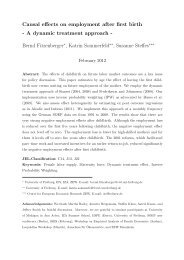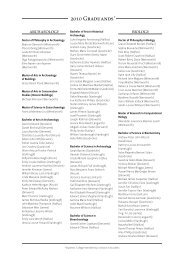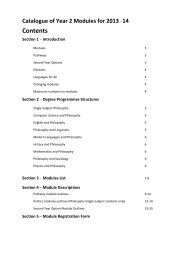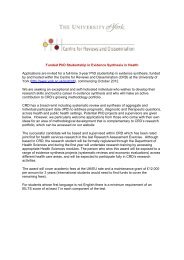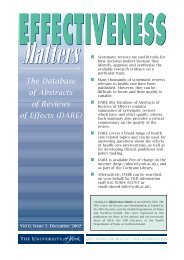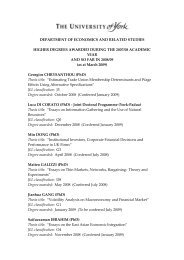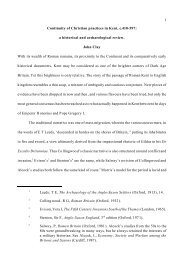Guidance notes for complaint investigators (PDF ... - University of York
Guidance notes for complaint investigators (PDF ... - University of York
Guidance notes for complaint investigators (PDF ... - University of York
You also want an ePaper? Increase the reach of your titles
YUMPU automatically turns print PDFs into web optimized ePapers that Google loves.
<strong>Guidance</strong> Notes <strong>for</strong> Investigators <strong>of</strong> Formal ComplaintThese <strong>notes</strong> are prepared as general guidance to support members <strong>of</strong> <strong>University</strong> <strong>of</strong> <strong>York</strong> staff whohave been asked to investigate <strong>for</strong>mal <strong>complaint</strong>s from students.Thank you <strong>for</strong> agreeing to investigate a Formal Complaint.Please familiarise yourself with the principles and provisions <strong>of</strong> the Complaints Procedure <strong>for</strong> Dealingwith Complaints from Students and Student Applicants(http://www.york.ac.uk/about/departments/support-and-admin/academic-registry/<strong>complaint</strong>s/ ).These must be fully observed throughout any investigation to avoid any further <strong>complaint</strong> arisingthat proper procedures were not followed.Complainants are asked to submit their <strong>complaint</strong> on a Formal Complaint Form. This has beendesigned to help you collect the material you need to begin your investigation. It has also beendesigned to help the student say what they need to say at the start <strong>of</strong> the procedure so that youhave a reasonably full picture <strong>of</strong> their concern and its history.The <strong>for</strong>m encourages complainants to itemise the details <strong>of</strong> the <strong>complaint</strong> so that you can addressseparate issues individually and can refer your findings and recommendations to each.As the role suggests, your job is to investigate the allegations that the student has made and tomake a recommendation to the Registrar and Secretary on the basis <strong>of</strong> what you find.To do this you should consider the student’s allegations and the evidence they provide to supportthese. You may triangulate what they have told you by seeking evidence from those about whomthe <strong>complaint</strong> is made. You may well have further questions to ask <strong>of</strong> the complainant and/or mayrequest them to produce additional relevant evidence.If you want the complainant or a member <strong>of</strong> the <strong>University</strong> to attend a meeting about the<strong>complaint</strong> you should give them the option <strong>of</strong> being accompanied by a member <strong>of</strong> the <strong>University</strong>(staff or student), a trade union representative (if they are a staff member) or an <strong>of</strong>ficer <strong>of</strong> theYUSU or GSA (if they are a student).When you have completed your investigation you should prepare a document which addresses thepoints raised in the <strong>complaint</strong> and consider the redress that they seek. You should also makerecommendations on the basis <strong>for</strong> your findings. Usually the investigator concludes that the<strong>complaint</strong> is justified, not justified, or partially justified. You should reach your conclusions based onthe balance <strong>of</strong> probabilities.The Academic Registrar’s <strong>of</strong>fice keeps a record <strong>of</strong> the progress <strong>of</strong> Formal Complaints. It is importantthat this record is kept up to date so that <strong>complaint</strong> investigations are not allowed to drag onunjustifiably. The Academic Registrar’s Office also keeps a log <strong>of</strong> the outcomes <strong>of</strong> Formal Complaints.It is helpful to keep in regular contact with the Academic Registrar’s Office as the investigationprogresses.You should send your completed report to the Registrar and Secretary, copied to the AcademicRegistrar. If the complainant remains dissatisfied with the outcome <strong>of</strong> the <strong>complaint</strong> they can
equest that the Registrar and Secretary refers the matter to be reviewed by a senior member<strong>of</strong>staff.If you are doing that review – as opposed to the first investigation assisting the Registrar andSecretary – your focus should be on the process <strong>of</strong> the first investigation and on any furthercomments or in<strong>for</strong>mation given by the complainant in their request <strong>for</strong> this review.You should submit your report <strong>of</strong> this review to the Registrar and Secretary, who will respond to thestudent. You should also copy your report to the Academic Registrar’s Office to update the log.If, following this review, the complainant remains dissatisfied, they can take their <strong>complaint</strong> to theOffice <strong>of</strong> the Independent Adjudicator at this stage. The letter in<strong>for</strong>ming the complainant <strong>of</strong> theoutcome <strong>of</strong> their review gives them the necessary documentation to take this <strong>for</strong>ward with the OIA,(unless they are an applicant in which case this option is not usually open to them).If the OIA decides to investigate the <strong>complaint</strong>, it is possible that you will be required to elaborate onthe procedure you adopted or on your findings. However, most correspondence with the OIA inrelation to <strong>complaint</strong>s is handled by the <strong>University</strong>’s in-house Legal Counsellor.At any stage <strong>of</strong> an investigation or a review, you may seek advice from the Registrar and Secretary,the Academic Registrar or the Legal Counsellor. They, in turn, may seek advice from specialist<strong>of</strong>ficers, such as the Senior Equalities and Diversity Advisor, the Director <strong>of</strong> Health and Safety or theData Protection Officer. In exceptional cases, we may also seek external legal advice.Please bear in mind that any written documentation (including electronic documents) relating to a<strong>complaint</strong> or the investigation/review <strong>of</strong> a <strong>complaint</strong>, may be subject to a data access request. Suchrequests should be passed to the <strong>University</strong>’s Data Protection Officer. Any queries regardingdocument retention should be referred to the Data Protection Officer.November 2013



